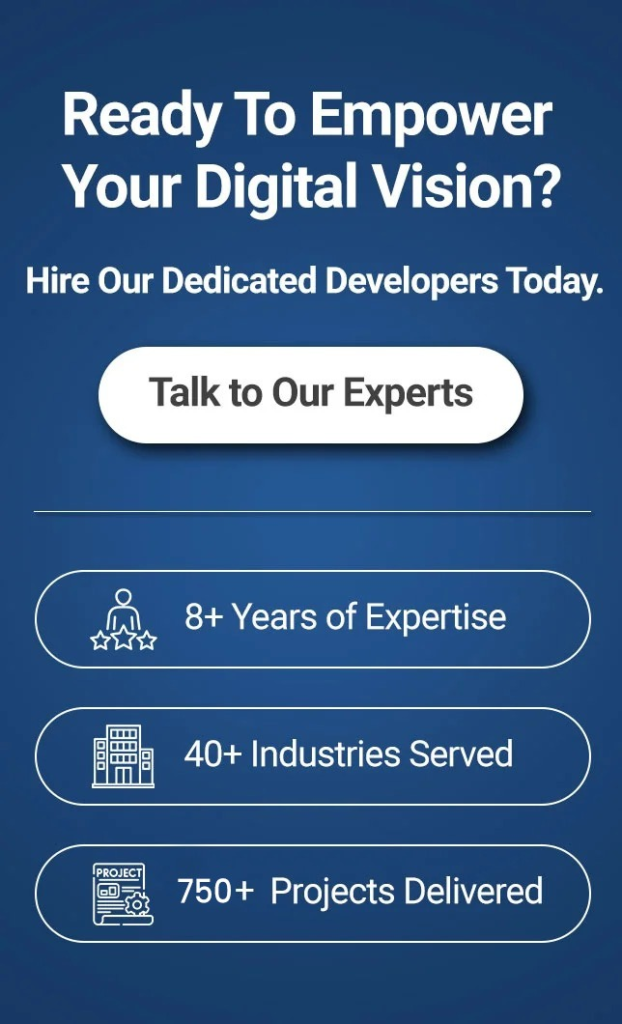So, you have got a new online business idea, right?
Well, that’s the reason, you are now super excited to put your idea to the forefront of your customers with a dedicated app!
Though it sounds fascinating, there are multiple complexities involved and one of them is choosing the right app development platform!
Let’s face some facts!
- The global mobile app market is all set to grow at an annual growth rate of 18.4% from $106.27 billion to $407.31 billion by the next 2-3 years.
- Nearly 95% of Facebook users prefer mobile devices to access content.
- Cloud-based web apps can bring cost savings of up to 77%.
Considering such facts, it’s no secret to look out for both web app and mobile app development services!
Since there are multiple app development frameworks available, choosing the right one may seem potentially daunting!
Don’t worry! In this post, we’ll discuss the differences between native, hybrid, and cross-platform app development frameworks to help you make the right choice.
What is Native App Development?
To put it simply, native apps are the types of apps that are specifically built for a specific platform or a device to cater to a particular set of audiences. One of the major highlights of these apps is that these apps may allow you to leverage the untapped potential of a device’s capabilities which ultimately foster enhanced performance and seamless user experience.
Furthermore, most people have a misconception that these apps are not just limited to mobile applications. Instead, native apps can be used for desktop operating systems like Windows, macOS, or Linux. Users can easily download these apps from the app stores.
What are Some of the Popular Examples of Native Apps?
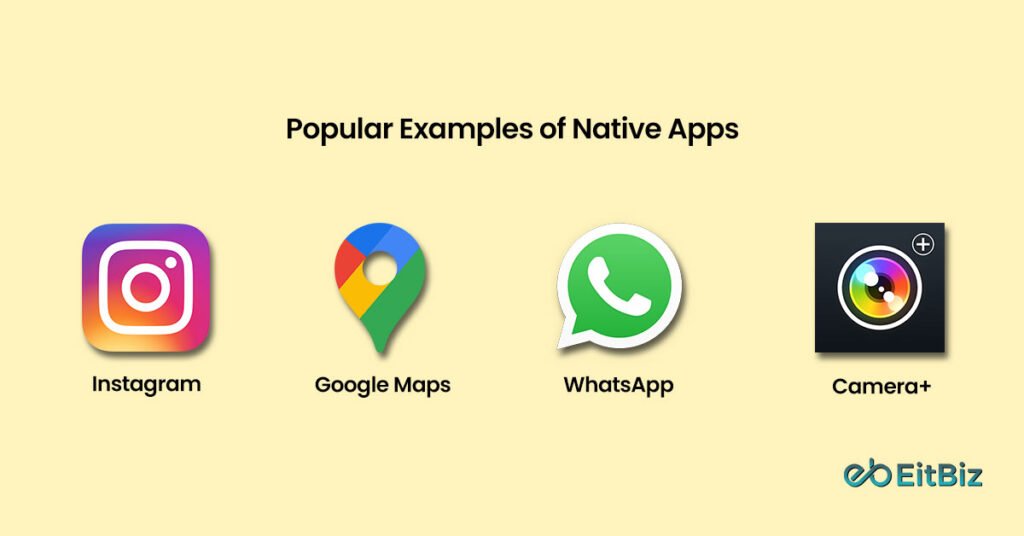
Let’s take a look at some of the popular examples of native apps.
- Google Maps
- Camera+
But that’s not the end of Native apps! There’s more to the story!
What are the Benefits of Native App Development?
Whether you want to build a web app or a mobile app, Native app development may be an ideal choice for you for the following reasons. Let’s discuss them in detail!
#1. Enhanced Performance
One of the biggest benefits of native app development is that it enables the app to run smoothly and quickly without worrying about bugs and errors. Since a specific set of devices or platforms is targeted, native apps can deliver faster load times, uninterrupted animations, and overall improved performance unlike hybrid or cross-platform apps.
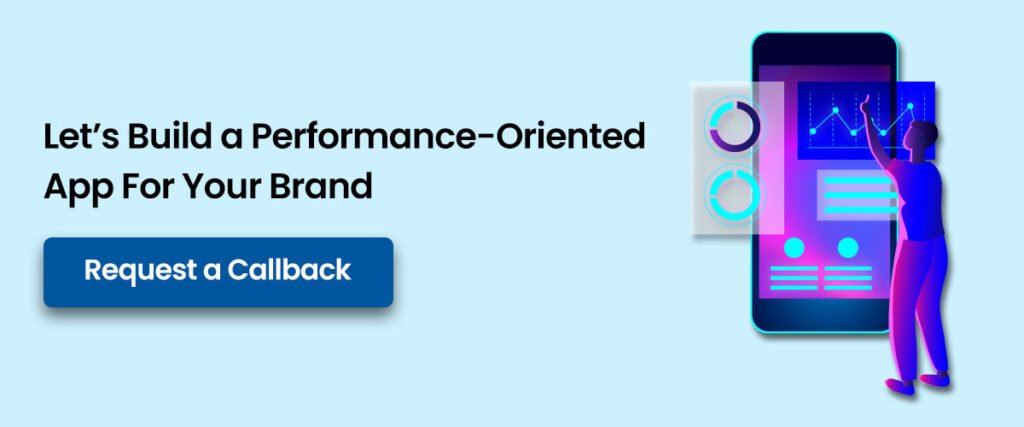
#2. Better Reliability
Another major highlighting aspect of native app development is that these apps are less prone to crashes or errors, which makes them incredibly reliable. Furthermore, since they are built using a specific type of technology or tools for a dedicated platform, they provide better stability in terms of mobile or web app development.
#3. Enhanced User Experience
One of the biggest benefits of native app development is that it provides a seamless and intuitive user experience. Since these apps are specifically designed for a specific platform, they can provide a uniform experience to users of all types.
Next, What are Hybrid Applications?
Hybrid applications are dedicated mobile applications that combine the best of native and web applications and allow users to access device-specific features such as contacts, cameras, and GPS.
Since these apps are built using a wide range of web technologies like CSS, HTML, and JavaScript, they provide the best of flexibility and hassle-free development. These applications allow professional app developers to write a single codebase that can be deployed to multiple platforms such as iOS & Android.
One of the highlighting aspects of these apps is that they allow developers to create apps that work across multiple platforms without the need to write code for each platform separately.
What are Some of the Popular Examples of Hybrid Apps?
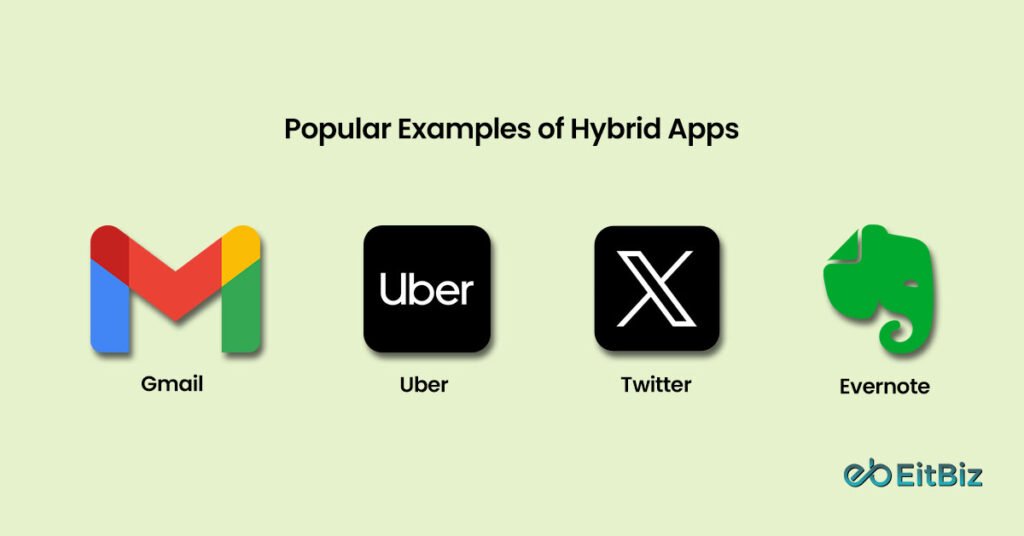
Here are some of the popular apps built using hybrid app development.
- Gmail
- Uber
- Evernote
What are the Benefits of Hybrid App Development?
Though there are multiple benefits of the hybrid framework in the web app or mobile app development, we’ve discussed a few to get started. Let’s discuss the benefits of hybrid app development.
#1. Cross-Platform Compatibility
Since hybrid applications can run on multiple platforms like iOS and Android, developers can easily build the application once and deploy it across platforms to save both time and money.
#2. Faster Development Time
Unlike native apps, hybrid apps can be built quickly and easily because these apps efficiently leverage a wide range of web technologies like React Native, Apache Cordova, and Ionic which may facilitate quick and seamless app development.
#3. Hassle-Free Maintenance
Since these hybrid apps only use a single codebase, these apps are easier to maintain and do not require specialized plugins and tools for maintenance.
What are Cross-Platform Apps?
Cross-platform apps are specific apps that are designed to perform seamlessly across multiple operating systems and devices using a single codebase. When it comes to cross-platform app development, developers leverage frameworks such as Xamarin, React Native, and Flutter to build web and mobile apps.
With lower development costs and wider audience reach, cross-platform apps are an ideal solution for businesses on a tight budget.
What are the Popular Examples of Cross-Platform Apps?
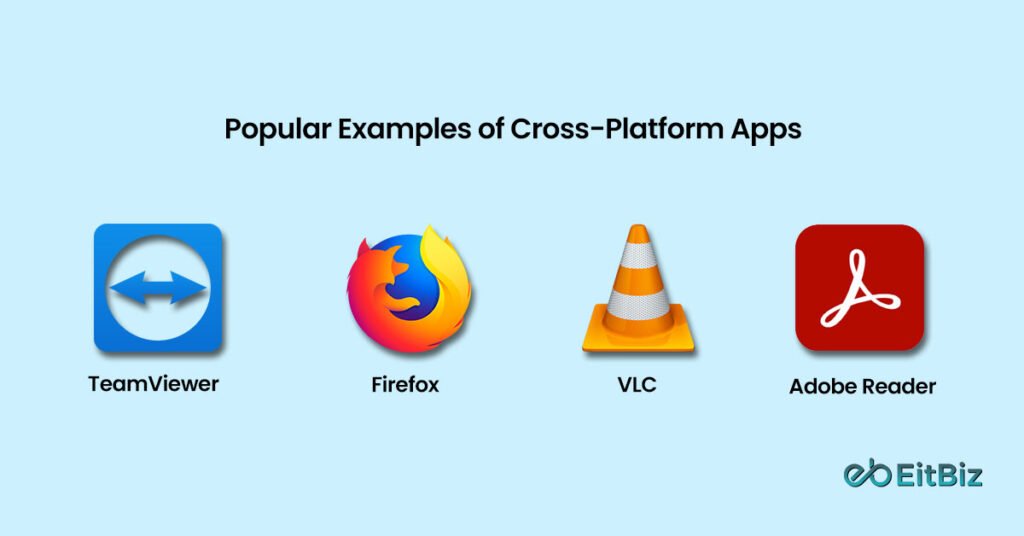
Let’s take a look at the popular apps built using cross-platform frameworks.
- TeamViewer
- Firefox
- VLC
- Adobe Reader
What are the Benefits of Cross-Platform App Development?
Whether you want to build a mobile app or a web app, choosing a cross-platform framework will never disappoint you for the following reasons. Let’s discuss the benefits of cross-platform app development.
#1. Wider Audience Reach
One of the biggest benefits of cross-platform app development is that when you build these apps, they can easily target a wider audience and ultimately open up potential revenue streams.
#2. Shorter Time to Market
Another interesting highlight of cross-platform app development is that it allows you to build separate apps for each platform using a single codebase. Thus, it minimizes the development time.
#3. Access to Open & Large Community
When you consider cross-platform app development for building apps, you can have access to a large number of communities which allows you to get your hands on documentation, extended support, tools, and more.
Final Thoughts
So, there you have it! That’s a wrap to the difference between native vs. hybrid vs cross-platform app development in 2025! It is no secret that building a mobile or web app requires a careful approach and the selection of the right app development framework.
Since each framework has its own set of pros, having due diligence is a must! From shorter development time to faster time to market, choosing the right framework may let you reap countless benefits. Planning to build a solid web or mobile app? If so, look no further than EitBiz and make your app development journey smooth, hassle-free, and growth-oriented. Visit EitBiz to build and launch your app. Drop us an email at info@eitbiz.com or call us at +1(812)530-6300 today!


